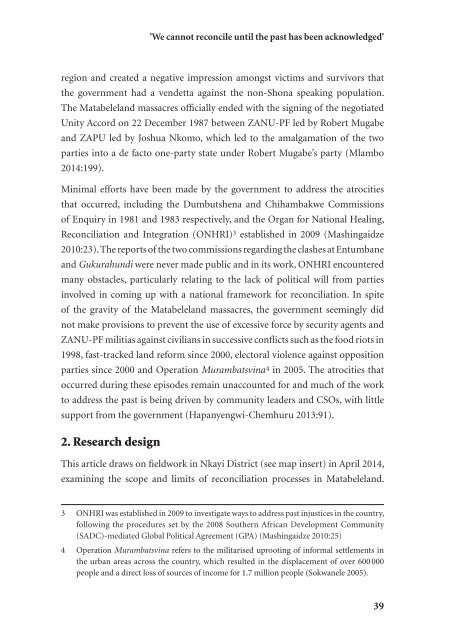ACCORD-ajcr-2015-1
ACCORD-ajcr-2015-1
ACCORD-ajcr-2015-1
- No tags were found...
Create successful ePaper yourself
Turn your PDF publications into a flip-book with our unique Google optimized e-Paper software.
'We cannot reconcile until the past has been acknowledged'<br />
region and created a negative impression amongst victims and survivors that<br />
the government had a vendetta against the non-Shona speaking population.<br />
The Matabeleland massacres officially ended with the signing of the negotiated<br />
Unity Accord on 22 December 1987 between ZANU-PF led by Robert Mugabe<br />
and ZAPU led by Joshua Nkomo, which led to the amalgamation of the two<br />
parties into a de facto one-party state under Robert Mugabe’s party (Mlambo<br />
2014:199).<br />
Minimal efforts have been made by the government to address the atrocities<br />
that occurred, including the Dumbutshena and Chihambakwe Commissions<br />
of Enquiry in 1981 and 1983 respectively, and the Organ for National Healing,<br />
Reconciliation and Integration (ONHRI) 3 established in 2009 (Mashingaidze<br />
2010:23). The reports of the two commissions regarding the clashes at Entumbane<br />
and Gukurahundi were never made public and in its work, ONHRI encountered<br />
many obstacles, particularly relating to the lack of political will from parties<br />
involved in coming up with a national framework for reconciliation. In spite<br />
of the gravity of the Matabeleland massacres, the government seemingly did<br />
not make provisions to prevent the use of excessive force by security agents and<br />
ZANU-PF militias against civilians in successive conflicts such as the food riots in<br />
1998, fast-tracked land reform since 2000, electoral violence against opposition<br />
parties since 2000 and Operation Murambatsvina 4 in 2005. The atrocities that<br />
occurred during these episodes remain unaccounted for and much of the work<br />
to address the past is being driven by community leaders and CSOs, with little<br />
support from the government (Hapanyengwi-Chemhuru 2013:91).<br />
2. Research design<br />
This article draws on fieldwork in Nkayi District (see map insert) in April 2014,<br />
examining the scope and limits of reconciliation processes in Matabeleland.<br />
3 ONHRI was established in 2009 to investigate ways to address past injustices in the country,<br />
following the procedures set by the 2008 Southern African Development Community<br />
(SADC)-mediated Global Political Agreement (GPA) (Mashingaidze 2010:25)<br />
4 Operation Murambatsvina refers to the militarised uprooting of informal settlements in<br />
the urban areas across the country, which resulted in the displacement of over 600 000<br />
people and a direct loss of sources of income for 1.7 million people (Sokwanele 2005).<br />
39


